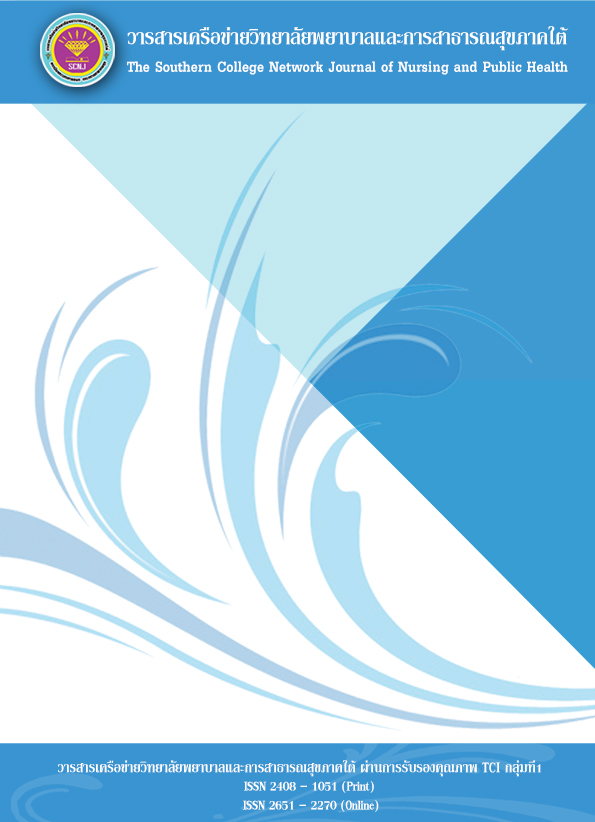ผลของโปรแกรมส่งเสริมการจัดการกลุ่มอาการด้านทางเดินอาหารและอาการเหนื่อยล้า ต่อประสบการณ์อาการของผู้ป่วยมะเร็งเต้านมที่ได้รับเคมีบำบัด
คำสำคัญ:
กลุ่มอาการ, โปรแกรมส่งเสริมการจัดการกลุ่มอาการด้านทางเดินอาหารและอาการเหนื่อยล้า, ประสบการณ์อาการบทคัดย่อ
การวิจัยกึ่งทดลองครั้งนี้มีวัตถุประสงค์เพื่อศึกษาผลของโปรแกรมส่งเสริมการจัดการกลุ่มอาการด้านทางเดินอาหารและอาการเหนื่อยล้าต่อประสบการณ์อาการของผู้ป่วยมะเร็งเต้านมที่ได้รับเคมีบำบัดที่เข้ารับการรักษา ณ หน่วยเคมีบำบัด โรงพยาบาลศูนย์แห่งหนึ่งในภาคใต้ โดยใช้กรอบแนวคิดการจัดการอาการ คัดเลือกกลุ่มตัวอย่าง จำนวน 48 ราย เป็นกลุ่มควบคุม 24 ราย ได้รับการพยาบาลตามปกติ และกลุ่มทดลอง 24 ราย ได้รับโปรแกรมส่งเสริมการจัดการกลุ่มอาการด้านทางเดินอาหารและอาการเหนื่อยล้าของผู้ป่วยมะเร็งเต้านมที่ได้รับเคมีบำบัด โดยโปรแกรมประกอบด้วย 3 ขั้นตอน คือ 1) การประเมินประสบการณ์กลุ่มอาการด้านทางเดินอาหารและอาการเหนื่อยล้า 2) การจัดการอาการในกลุ่มอาการด้านทางเดินอาหารและอาการเหนื่อยล้า และ 3) ประเมินผลลัพธ์การจัดการอาการในกลุ่มอาการด้านทางเดินอาหารและอาการเหนื่อยล้า โดยประเมินประสบการณ์อาการด้านความถี่และความรุนแรง ใช้ระยะเวลาทั้งสิ้น 21 วัน โดยโปรแกรมและแบบประเมินประสบการณ์อาการในกลุ่มอาการด้านทางเดินอาหารและอาการเหนื่อยล้า ผ่านการตรวจสอบจากผู้ทรงคุณวุฒิจำนวน 3 ท่าน และแบบประเมินประสบการณ์อาการในกลุ่มอาการด้านทางเดินอาหารและอาการเหนื่อยล้ามีค่าความเที่ยงแบบวัดซ้ำเท่ากับ .98 และค่าความตรงเชิงเนื้อหาทั้งฉบับ เท่ากับ 1.0 วิเคราะห์ข้อมูลโดยใช้สถิติพรรณนา และทดสอบสมมติฐานการวิจัยด้วยสถิติทีอิสระ และสถิติความแปรปรวนร่วม (ANCOVA) ผลการวิจัยพบว่า
ค่าเฉลี่ยประสบการณ์อาการของผู้ป่วยมะเร็งเต้านมที่ได้รับเคมีบำบัดหลังได้รับโปรแกรมด้านความถี่และด้านความรุนแรง ต่ำกว่าผู้ป่วยที่ได้รับการพยาบาลตามปกติอย่างมีนัยสำคัญทางสถิติ (p<.001 และ p=.001 ตามลำดับ)
ดังนั้น พยาบาลจึงควรนำโปรแกรมส่งเสริมการจัดการกลุ่มอาการด้านทางเดินอาหารและอาการเหนื่อยล้าไปใช้กับผู้ป่วยกลุ่มดังกล่าว เพื่อลดประสบการณ์อาการกลุ่มอาการด้านทางเดินอาหารและอาการเหนื่อยล้า
เอกสารอ้างอิง
Kamphun, W., Wonghongkul, T., & Pinyokham, N. (2011). Effect of a Symptom Management Enhancement Program on Fatigue in Breast Cancer Patients Receiving Chemotherapy. Nursing Journal, 38(2), 1-17.
National Cancer Institute. (2014). Hospital-Based-Cancer Registry Annual Report 2555. Bangkok: Eastern.
Bureau of Policy and Strategy of the Ministry of Public Health. (2013). Summary Report of Illness B.E. 2556. Nonthaburi: The War Veterans Organization of Thailand.
Foythong, S., Harnirattisai, T., & Wattana, C. (2012). The Effects of a Symptom Management Program on Common Symptom Experiences in Breast Cancer Patients Receiving Adjuvant Chemotherapy. Journal of Nursing Science Chulalongkorn University, 24(3), 107-119.
Prisutkul, A., Sukuntapan, M., Arundon, T., Dechaphunkul, A., & Pripetchkaew. (2013). Symptom Experiences, Symptom Management Strategies and Outcomes in Patients Under-Going Chemotherapy. Thai Cancer Journal, 33(3), 98-110.
Barsevick, A. M., Whitmer, K., Nail, M. L., Beck, L. S., & Dudley, N. W. (2006). Symptom Clusters Research: Conceptual, Design, Measurement, and Analysis Issues. The Journal of Pain and Symptom Management, 31(1), 85-95.
Bower, M., & Waxman, J. (Eds.). (2010). Lecture Notes: Oncology. Chichester: Wiley-Blackwell.
Cherwin, C.H. (2012). Gastrointestinal Symptom Representation in Cancer Symptom Cluster: A Synthesis of the Literature. Oncology Nursing Forum, 39(2), 157-165.
Dodd, M., Janson, S., Facione, N., Faucett, J., Froelicher, E. S., Humphreys, J., et al. (2001). Advancing the Science of Symptom Management. Journal of Advance Nursing, 33(5), 668-676.
Dodd, M., Miaskowski, C., & Paul, S.M. (2001). Symptom Cluster and Their Effect on the Functional Status of Patients with Cancer. Oncology Nursing Forum, 28(3), 465-470.
Kim, H. J., MaGuir, D. B., Tulman, L., & Barsevick, A. M. (2005). Symptom Cluster. Cancer Nursing, 28(3), 270-280.
Professional Nursing and Midwifery Revision of the Act B. E. 2540 (1997). The Government Gazette. Vol. 114, Vol. 75, December 23, 1997.
Robergs, A. R., & Keteyian, J. S. (2003). Fundamentals of Exercise Physiology: For Fitness, Performance, and Health. (2nd ed., pp. 79-205). New York: McGraw-Hill.
Suwisith, N., Hanucharurnkul, S., Dodd, M., Vorapongsathorn, T., Pongthavorakamol, K., & Asavametha, N. (2008). Symptom Cluster and Functional Status of Woman with Breast Cancer. Thai Journal of Nursing Research, 12(3), 153-165.
World Health Organization. (2014). Cancer Country Profiles. Retrieved from November 5, 2013, from http://www.who.int/cancer-profils/tha_en.pdf.
ดาวน์โหลด
เผยแพร่แล้ว
ฉบับ
ประเภทบทความ
สัญญาอนุญาต
1. บทความหรือข้อคิดเห็นใด ๆ ที่ปรากฏในวารสารเครือข่าย วิทยาลัยพยาบาลและการสาธารณสุขภาคใต้ ที่เป็นวรรณกรรมของผู้เขียน บรรณาธิการหรือเครือข่ายวิทยาลัยพยาบาลและวิทยาลัยการสาธารณสุขภาคใต้ ไม่จำเป็นต้องเห็นด้วย
2. บทความที่ได้รับการตีพิมพ์ถือเป็นลิขสิทธิ์ของ วารสารเครือข่ายวิทยาลัยพยาบาลและการสาธารณสุขภาคใต้








